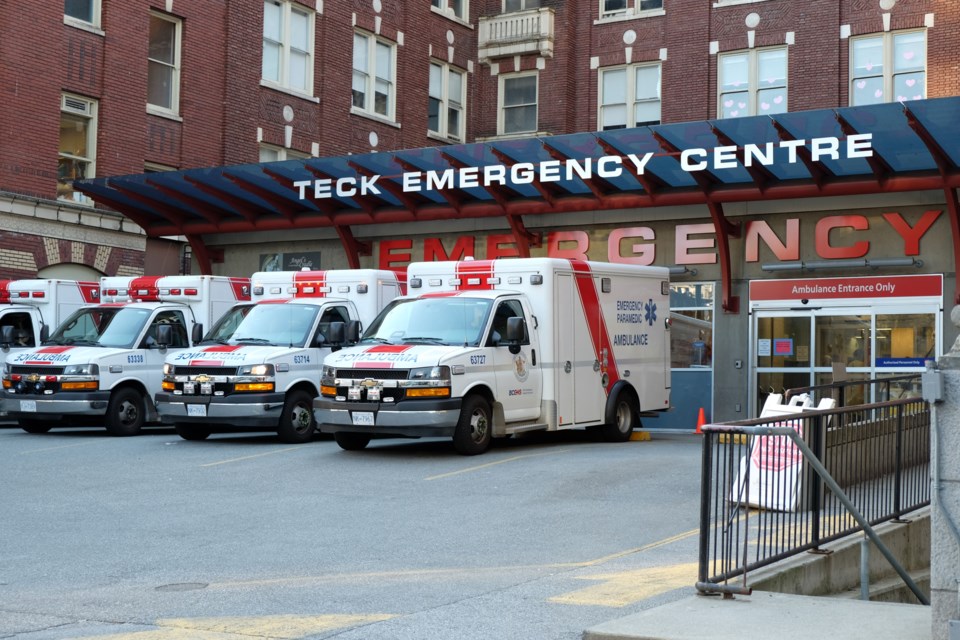Dr. Daniel Kalla said that fear is unrealized and wants people experiencing chest pains, stroke-like symptoms and other serious medical concerns to go to hospital.
“We have no evidence that anybody has ever been infected in Vancouver by going to an emergency department for another issue,” Kalla told Glacier Media Tuesday.
“We have truly minimized the risk of [COVID-19] infection.”
The emergency department was reorganized to contain COVID-19 patients and those presumed to be infected with the disease, said Kalla, noting enhanced cleaning and decontamination occurs regularly.
Protocols are also in place for staff to avoid contracting and potentially spreading the virus, with personal protective equipment worn by medical teams.
“We feel it’s very safe to come to the emergency department,” said Kalla, emphasizing the dangers for people with serious health problems who avoid hospitals.
“We know the risk of ignoring issues like an early stroke or chest pain that might be a warning of an impending heart attack — or shortness of breath that’s a sign of a severe asthma attack — is much higher than facing risk of exposure to COVID-19.”
The hospital currently has seven COVID-19 patients, with four on ventilators. At its peak, there were upwards of 16 COVID-19 patients at St. Paul’s, with six to seven on ventilators.
Across the Vancouver Coastal Health region, which includes Vancouver, Richmond, the North Shore and Sunshine Coast, there are a total of 35 COVID-19 patients in hospital, with 10 on ventilators.
Kalla said visits to the emergency department at some other hospitals in the region are down as much as 50 per cent, including Mount Saint Joseph Hospital in East Vancouver, where he also heads the ER.
 Dr. Daniel Kalla, head of the emergency departments at St. Paul’s Hospital and Mount Saint Joseph Hospital. Photo courtesy Providence Health Care
Dr. Daniel Kalla, head of the emergency departments at St. Paul’s Hospital and Mount Saint Joseph Hospital. Photo courtesy Providence Health CareFewer people at work in Vancouver, walking in the streets and driving their cars also factors in to the drop in visits, Kalla said. But it is not one type of illness or injury that health-care workers are seeing less of at hospitals. — “it’s across the board,” he said, but pointed to the significant drop in patients experiencing mental health issues.
“With the stress and fear and anxiety out there, it doesn’t make sense for mental health visits to be down,” he said.
St. Paul’s Hospital has long been the go-to medical facility for people who have suffered a drug overdose, or have substance abuse issues that need medical attention.
Kalla said those patients continue to arrive, but is worried some are staying home or in the streets. Mayor Kennedy Stewart recently reported 16 overdose deaths occurred in Vancouver over a two-week period.
The drop in patient volumes at St. Paul’s has meant the amount of time it takes for a patient to see a doctor has been reduced by about 10 minutes.
There are also plenty of beds available.
“The hospitals, in terms of capacity, have never had more capacity, with all the surgeries cancelled and all the beds made available,” he said.
“The occupancy in the units are 50 per cent of normal.”
Though patients may be connecting through electronic means with doctors and specialists, Kalla said those same patients are not getting access to speciality clinics because they are closed, or operating at a limited capacity.
“We know that a lot of them are not getting better treatment for their underlying conditions,” he said.
Kalla, who is also a novelist and wrote “Pandemic” in 2005, said he understands the images of overrun hospitals in Italy and New York City are playing on British Columbians’ fears about attending a hospital.
But he said B.C. hospitals have not faced a surge of patients, although he said medical teams have trained for the possibility of an escalation in cases.
“We were so prepared for an onslaught,” Kalla said.
“We were worried about our [intensive care unit] capacity being overwhelmed, but we’ve been relatively — thankfully — underwhelmed by COVID-19.”
Added Kalla: “We’ve been so lucky, even compared to the rest of Canada. B.C. has been so well managed and lucky at the same time.”
As of Monday, the Ministry of Health reported 1,699 total cases of COVID-19, with 1,039 people recovered. A total of 104 people were in hospital, with 49 in intensive care. Since B.C.’s first reported coronavirus case in January, 86 people have died.
@Howellings



